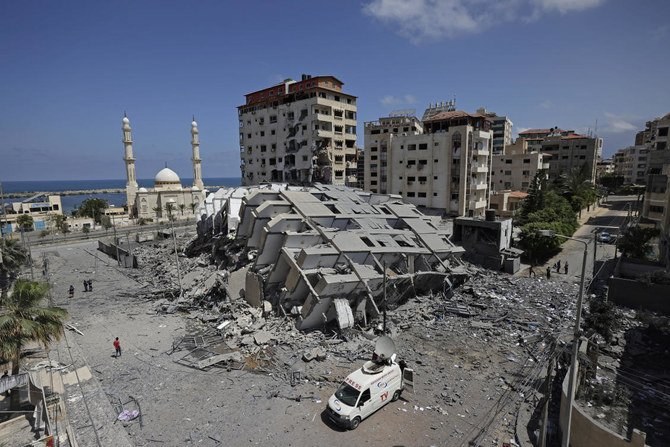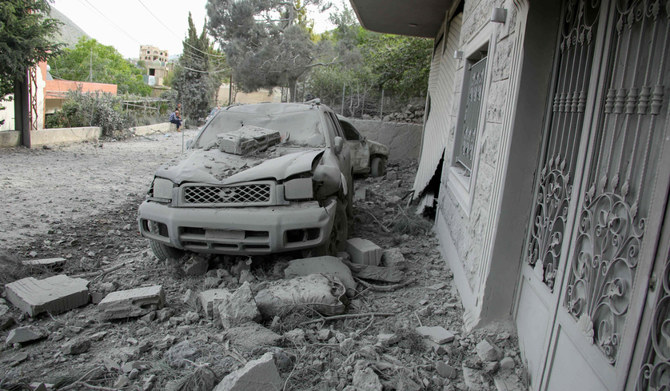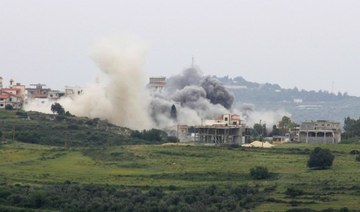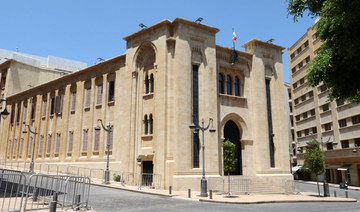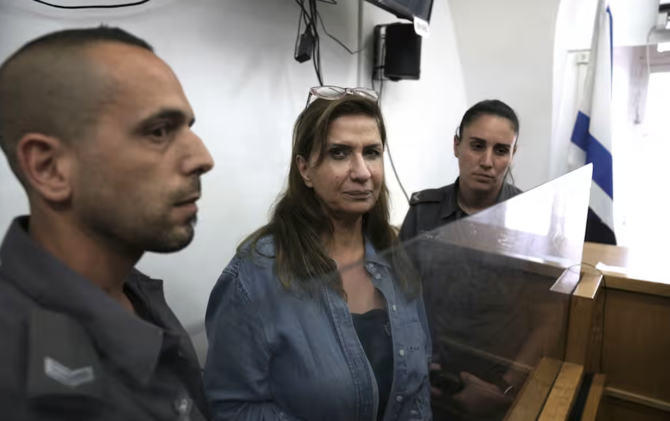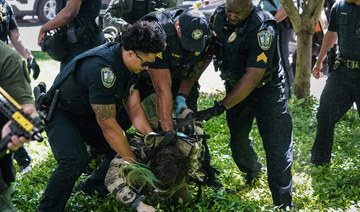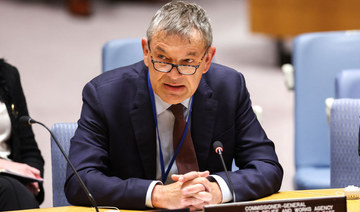TEL AVIV: Heavy exchanges of rocket fire and air strikes, and rioting in mixed Jewish-Arab towns, fueled fears Wednesday that deadly violence between Israel and Palestinians could spiral into “full-scale war.”
Israel’s Defense Minister Benny Gantz vowed more attacks on Hamas and other Islamist militant groups in Gaza to bring “total, long-term quiet” before considering a cease-fire.
“This is just the beginning,” warned Prime Minister Benjamin Netanyahu. “We’ll deliver them blows they haven’t dreamt of.”
Gaza militants have launched more than 1,000 rockets since Monday, said Israel’s army, which has carried out hundreds of air strikes on Islamist groups in the crowded coastal enclave of Gaza.
The most intense hostilities in seven years have killed at least 56 people in Gaza, including 14 children, and six in Israel, including an Israeli soldier and one Indian national, since Monday.
Three Palestinians were killed in West Bank clashes. And at least 230 Palestinians and 100 Israelis have been wounded.
An Israeli soldier was killed on Wednesday when Palestinian militants in Gaza fired an anti-tank missile near the border, the army said, amid tit-for-tat rocket fire and air strikes.
A statement from the army identified the soldier as Omer Tabib, 21, who was “killed this morning by the anti-tank missile launched by the Hamas terror group from Gaza at Israel.”
The bloodshed was triggered by weekend unrest at Jerusalem’s Al-Aqsa mosque compound, which is sacred to both Muslims and Jews.
As world powers voiced growing alarm over the crisis, the UN Middle East envoy Tor Wennesland warned that “we’re escalating toward a full-scale war.”
The UN Security Council held another emergency meeting without agreeing on a joint statement due to opposition from the United States, Israel’s ally.
The European Union’s foreign policy chief Josep Borrell called for an immediate end to violence in Israel and the occupied Palestinian Territories that has killed more than 50 people since Monday.
“Everything must be done to prevent a broader conflict, which will, first and foremost, affect the civilian populations on both sides,” Borrell said in a statement that condemned actions by both sides.
France’s foreign minister said the international community must do everything possible to avert a new conflict between Israel and the Palestinians, after Palestinian militants fired hundreds of rockets and the Israeli army launched air strikes.
“The cycle of violence in Gaza, in Jerusalem but also in the West Bank and several cities in Israel risk leading to a major escalation,” Jean-Yves Le Drian told parliament. “Everything must be done to avoid... a conflict” that would be the fourth such deadly confrontation in the last 15 years, he said.
Russian Foreign Minister Sergei Lavrov called for an urgent meeting of the Middle East Quartet in order to halt violence between Israel and the Palestinians.
Speaking alongside UN Secretary-General Antonio Guterres, Lavrov said: “Today we’ve come to the common opinion that the most pressing task is to convene the Quartet of international mediators — Russia, the United States, the UN and the EU.”
Sergei Vershinin, a Russian Deputy Foreign Minister, called on Israel to “immediately” stop all settlement activities in the Palestinian Territories, RIA news agency reported.
Vershinin also said that Moscow called for the “status quo of Jerusalem’s sacred sites” to be respected, RIA reported.
China’s special envoy on the Middle East, Zhai Jun, expressed “deep concern” over escalating clashes between Palestinians and Israel and urged all parties to exercise restraint to avoid further casualties.
In a meeting with Arab envoys and the chief representative of the Arab League in China, Zhai said Beijing would continue to push the UN Security Council to take action on the situation in East Jerusalem as soon as possible, according to a foreign ministry statement.
Netanyahu declared a state of emergency in the mixed Jewish-Arab Israeli city of Lod, where police said “wide-scale riots erupted among some of the Arab residents,” and authorities later imposed an overnight curfew there.
There were fears of widening civil unrest as protesters waving Palestinian flags burnt cars and properties, including a synagogue, clashed with Israeli police and attacked Jewish motorists in several Jewish-Arab towns.
Israel’s President Reuven Rivlin, in unusually strong language, denounced what he described as a “pogrom” in which “an incited and bloodthirsty Arab mob” had injured people and attacked sacred Jewish spaces.
Rivlin said Israelis needed “to be ready and armed, strong and determined, prepared to defend our home.”
Palestinian groups, mainly Hamas and Islamic Jihad, have launched more than 1,000 rockets, Israel’s army said, including hundreds at Tel Aviv, where air sirens wailed overnight.
Of these, 850 have hit in Israel or been intercepted by Israel’s Iron Dome air defense system, while the rest have crashed inside Gaza, the army said.
Israel has launched hundreds of air strikes on Gaza, the Israeli-blockaded strip of two million people that Hamas controls, targeting what the army described as “terror” sites.
Hamas said several of its top commanders were killed in Israeli strikes, including its military chief in Gaza City, Bassem Issa. Israel’s internal security agency, the Shin Bet, also identified three other top Hamas militants who it said were killed.
Its leader Ismail Haniyeh threatened to step up attacks, warning that “if Israel wants to escalate, we are ready for it.”
British Prime Minister Boris Johnson urged both sides to “step back from the brink.”
French Foreign Minister Jean-Yves Le Drian said “everything must be done” to avoid a new Middle East conflict.
Secretary of State Antony Blinken said a US envoy would travel to meet Israeli and Palestinian leaders to seek “a de-escalation of violence.”
In Gaza City, people sifted through debris after an Israeli air strike destroyed a 12-story building that Hamas had been a residential building. It was also known to house the offices of several Hamas officials.
Five members of a single family were killed by an Israeli strike in northern Gaza Tuesday, including young brothers Ibrahim and Marwan, who were filling sacks of straw at the time.
“We were laughing and having fun when suddenly they began to bomb us. Everything around us caught fire,” their cousin, also called Ibrahim, told AFP.
“I saw my cousins set alight and torn to pieces,” said the 14-year-old, breaking down in tears.
Opinion
This section contains relevant reference points, placed in (Opinion field)
In Israel’s central city of Lod, a man and a girl were killed Wednesday by rocket fire from Gaza. Israel identified one of the dead as 16-year-old Nadin Awad, an Arab Israeli.
Her cousin, Ahmad Ismail, told public broadcaster Kan that he was near Nadin when she was killed alongside her father Khalil Awad, 52.
“I was at home, we heard the noise of the rocket,” said Ismail. “It happened so quickly. Even if we had wanted to run somewhere, we don’t have a safe room.”
An Israeli woman was killed when rockets hit Rishon Letzion near Tel Aviv. In Ashkelon, a town near Gaza which Hamas threatened to turn into “hell,” rockets fired by militants killed two women Tuesday.
The crisis flared last Friday when weeks of tensions boiled over and Israeli riot police clashed with crowds of Palestinians at Jerusalem’s Al-Aqsa mosque.
Nightly disturbances have since flared in east Jerusalem, leaving more than 900 Palestinians injured, according to the Palestinian Red Crescent.
The unrest has been driven by anger over the looming evictions of Palestinian families from the Jerusalem neighborhood of Sheikh Jarrah.
Large protests have been held in solidarity with Palestinians around the world, including in Britain and South Africa as well as in Muslim-majority countries including Kuwait, Lebanon, Oman, Pakistan, Tunisia and Turkey.
(With Reuters and AFP)



